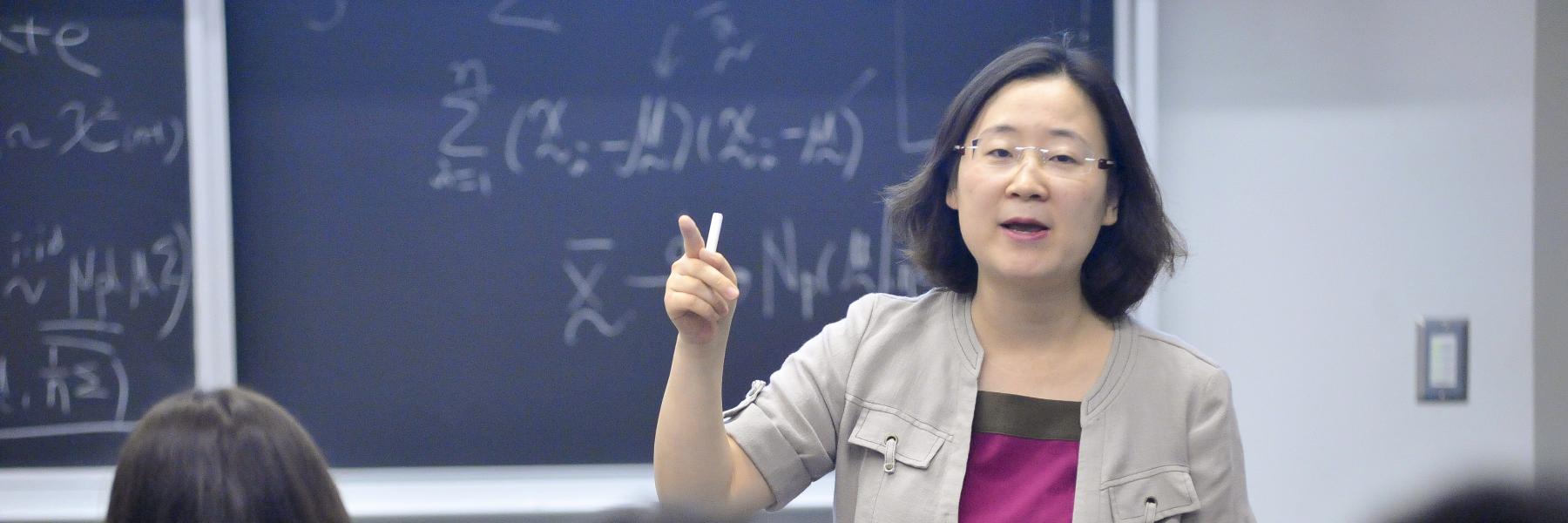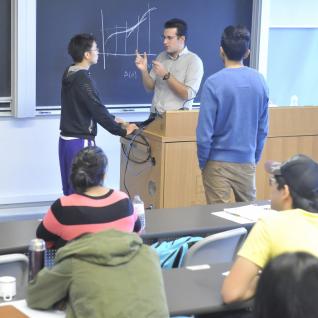Statistics Major (HBSc)
Admissions Category: Statistics

Program Overview
Statistics is the study of the collection, organization, analysis, interpretation and presentation of data. The discipline is research-intensive and includes many interesting aspects such as probability and game theory, statistical modeling and analysis. All of these are applicable to virtually every field. Studying Statistics is an excellent choice for students with strong quantitative skills and an interest in applying these skills to solve practical problems. The Statistics Major or Minor combines well with programs such as Health Studies, Environmental Science, Public Policy, International Development Studies, Economics or Psychology, just to name a few.
Complementary Programs:
Mathematics, Computer Science, Economics, Management, Environmental Science, Health Studies, International Development, Physical Sciences, Psychology as well as many others.
Check out future career opportunities and skills acquired from completing this program:
Competencies & Skills
- Identifying relationships and trends in data and factors that could affect research results.
- Reporting results of statistical analyses in the form of graphs, charts and tables.
- Analysing and interpreting statistical data to identify significant differences in relationships.
Careers for Graduates
- Actuarial Analyst in Insurance Providers
- Business Analyst in Telecommunications
- Associate in Compensation Consulting Firms
- Associate Risk Consultant in High Tech Manufacturers
- Consulting Associate in Software Developers
- Data & Incentives Analyst in Technology Integration Companies
Further Education
- Statistics
- Actuarial Science
- Epidemiology
- Accounting or Taxes
- Bioinformatics
- Business Administration
- Chartered Financial Analyst
Program Pathway
Year 1 | Year 2 | Year 3 | Year 4Choose Your Courses Wisely
-
Use Degree Explorer to plan your courses and program of interest.
Develop Your Academic & Research Skills
-
Visit CTL’s Math & Statistics Learning Centre for tutoring services.
-
Schedule an appointment with your Program Librarian for in-depth research assistance with your assignments.
-
Get writing support at CTL’s Writing Centre.
Apply Theory to Practice
-
Attend the UTSC Faculty Mix & Mingle Fair to connect with professors and learn more about their specialties.
-
Start building your Co-Curricular Record (CCR) and search for Experiential Learning and Work-Integrated Learning opportunities on CLNx.
Become an Engaged Citizen (Locally & Globally)
-
Get involved with the Association of Mathematical and Computer Science Students (AMACSS); also explore other relevant student clubs and activities on campus.
-
Explore DSL programs that will build your leadership skills by getting involved in the community.
Plan for Your Future Career
-
Volunteer with organizations to explore your interests; check listings on CLNx (>Jobs & Recruitment).
-
Attend the Get Experience Fair in September and register with SCSU’s Volunteer Network Program to explore opportunities.
Year 2
Choose Your Courses Wisely
- B-level courses: MATB24H3, MATB41H3, MATB42H3, STAB52H3, STAB57H3.
- Use Degree Explorer to plan your courses and program.
- Meet with your Program Advisor or Supervisor to ensure you are on track with your degree.
Develop Your Academic & Research Skills
-
Further develop your general academic skills by attending workshops offered by the Academic Advising & Career Centre (AA&CC) and Centre for Teaching & Learning (CTL).
Apply Theory to Practice
-
Get involved in relevant opportunities on and/or off campus; apply to Work Study, or other part-time and summer jobs on CLNx (>Jobs & Recruitment).
Become an Engaged Citizen (Locally & Globally)
-
Check CLNx (>Jobs & Recruitment) for Work Study or volunteer positions on campus to gain experience and to get involved.
Plan for Your Future Career
-
Considering grad school? Speak to professors and advisors early so you are on track.
-
Explore careers through the AA&CC’s Job Shadowing and In The Field programs.
Year 3
Choose Your Courses Wisely
- Take STAC67H3.
- 1.5 credits as follows: any C- or D-level STA courses, except STAC32H3, STAC53H3 and STAD29H3.
- 1.5 credits from: STAA57H3, ACTB40H3, STAB41H3, MATB61H3 or any C- or D-level CSC, MAT or STA courses.
- Use Degree Explorer to ensure you are on track with your degree.
Develop Your Academic & Research Skills
- Consider competing for the UTSC Library Undergraduate Research Prize or Poster Forum.
- Check the department website for summer research and scholarship opportunities.
Apply Theory to Practice
- Build on your skills and knowledge through relevant events offered through your department, student groups, DSL and the AA&CC.
Become an Engaged Citizen (Locally & Globally)
- Run for an elected position in AMACSS or another student group or club.
- Look into volunteering or working overseas to expand your network through International Student Centre’s (ISC) Global Learning programs.
Plan for Your Future Career
- Plan a career path with a staff member at the AA&CC.
- Check CLNx for networking events and employer information sessions to attend.
- Attend the Graduate & Professional School Fair in September.
Year 4
Choose Your Courses Wisely
-
Ensure you have fulfilled your degree-level breadth requirements.
-
Ensure you have fulfilled your degree-level C and D course requirements.
-
Use Degree Explorer to ensure you are on track to graduate.
-
Register your “Intent to Graduate” on ACORN by the deadline.
Develop Your Academic & Research Skills
-
Apply for an Academic Travel Fund through Department of Student Life (DSL) to research, present at a conference, or engage with the international academic community.
Apply Theory to Practice
-
Attend the Summer & Full-time Job Fair in January to meet with potential employers looking to hire students for summer and full-time positions relevant to your field.
Become an Engaged Citizen (Locally & Globally)
-
Participate in the AA&CC’s Partners in Leadership program to learn and network with an alumni mentor about transitioning to work or further education.
Plan for Your Future Career
-
Attend the AA&CC’s Get Hired job search conference in April/May.
-
Attend a Jobs for Grads orientation for a job search “crash course” and for access to full-time job listings.
-
Get your personal statement reviewed in the AA&CC.
